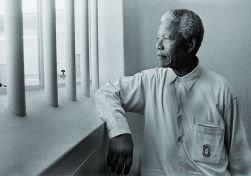Not a saint, but a hero
5. Dezember 2013
„Never, never and never again shall it be that this beautiful land will again experience the oppression of one by another and suffer the indignity of being the skunk of the world.
Let freedom reign!
The sun shall never set on so glorious a human achievement!
God bless Africa!“
(Nelson Mandela, 1994, Inaugural speech as freely elected president of the Republic of South Africa).
Schöne Sätze: Wainaina
10. September 2013
„Milka sitzt auf Kissen ausgestreckt im Laderaum des Toyota Land Cruiser neben den Kühlboxen, ihr Mund ist klebrig vom getrockneten Saft der Wassermelone; dicker, salziger Schweiß tropft ihr in die Augen, ihr Buch liegt aufgeschlagen, mit den Seiten nach unten, neben ihr. Ihr Körper, der ihr lang und unregelmäßig erscheint, weiß noch nicht, wie er sich anpassen soll. Zwei neue Wölbungen unter ihrem pinkfarbenen T-Shirt erinnern sie ständig daran, dass nichts mehr so ist, wie es war.“
(Binyavanga Wainaina, Ceteris paribus – Alles andere bleibt gleich)
Mugabe at his happiest
4. August 2013
„Alone, vilified, attacked by Western governments but victorious – Mugabe was at his happiest.“
(Richard Dowden, Africa. Altered States, Ordinary Miracles)
Hipster, Schweine, Kondome und keine Menschenrechte
25. Juli 2013
Robert Mugabe wettert weiter gegen Schwule. Und in Kamerun können Kondome Gefängnis bedeuten. Diesmal ganz ohne Satire . Read the rest of this entry »
Five key questions about Mali’s election
25. Juli 2013
Very good read on Mali’s elections by the the great Bridges from Bamako blog
The international media flock to cover elections for the same reasons they flock to cover sensational courtroom trials: these happenings are scheduled in advance, and have great potential for drama. As another election draws near, the world’s attention is turning back to Mali after a brief post-Serval lull.
US media coverage of African elections tends to frame election day as the culmination of a process of transition from an unstable, authoritarian society to a peaceful, democratic one. It portrays voting as organized by ethnic blocs, and focuses on what candidates say in their campaign speeches rather than what voters actually expect them to do. Such depictions are often misleading. Since understanding what’s at stake in Mali’s election depends on asking the right questions, I’d like to propose the following ones along with some preliminary answers.
How will voting take place?
Mali’s 1992 constitution requires the winner of a presidential election…
Ursprünglichen Post anzeigen 1.703 weitere Wörter
Robert Mugabe ist kein schwuler Hipster
23. Juli 2013
Wählt Robert Mugabe! Wählt Zanu-PF! Wählt Heterosexuelle! Bizarres aus dem Neuland Simbabwe. Read the rest of this entry »
Optimism and death in the face of Cameroon’s „gay scare“
18. Juli 2013
On Monday, July 15, Eric Lembembe, Cameroon’s most prominent LGBTI rights activists, was found dead in his home in Yaoundé. His body showed signs of severe torture. He is only the latest tragic victim of homophobic furor in Africa. He knew what might happen to him as he exposed what had happened to others, but in his very last article which was published after his death he still sounds optimistic.
„We need miracles“
10. Juli 2013
„We need jobs. We need good grades. We need green cards. We need American passports. We need our parents to understand that we are Americans. We need our children to understand they are Nigerians. We need new kidneys, new lungs, new limbs, new hearts. We need to forget the harsh rigidity of our lives, to remember why we believe, to be beloved, and to hope.We need miracles.“
